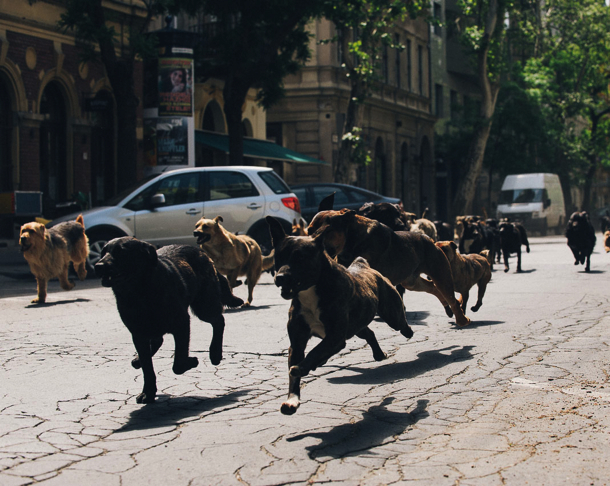
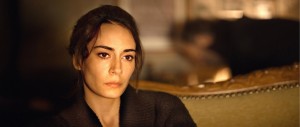 WINTER SLEEP ***** Palme D’Or | Cannes | 2014
WINTER SLEEP ***** Palme D’Or | Cannes | 2014
Sumptuously set in a mountain village in his beloved Anatolia, Nuri Bilge Ceylan’s arthouse character study enters the slow-burn orbit of loquacious ‘resting’ actor and hotelier, Aydin (Haluk Bilginer). Presiding over his family and local community, he portrays a misunderstood victim, a gracious and urbane sophisticate who, destined for better things, is forced to civilise his unworthy community and minister to the needs of passing travellers. As the winter closes in on this feudal kingdom, Aydin is forced to come to terms with himself through a bitter and dysfunctional relationship with sister (Demet Akbag) and younger wife (Melisa Sozen) who both despise him. Themes of social class, moral responsibility and altruism weave slowly and sinuously through this engrossing tale that is intimate in style, yet epic in its length and ambitions (196 mins). Stunning.
Mike Leigh’s ambitious biopic of J M W Turner’s middle-age serves as a worthy and painterly tribute to a national treasure. In a performance of some complexity, Timothy Spall portrays the ‘painter of light’ as a romantic gruffalo with a heart of gold but a curious style of love-making. The film opens in 1826 with a magnificent shot of a Dutch landscape where Turner is visiting for inspiration and work. A solid British cast works to the ‘Leigh family method’. At the Royal Academy we meet arch rivals John Constable (James Fleet) and his wealthy Patron and other Leigh staples (Lesley Manville, Ruth Sheen). All are carefully worked into the narrative along with a humorous vignette from Joshua Maguire as a verbose live-wire John Ruskin. In Margate, Turner finds peace amd contentment with a local landlady (a luminous Marion Bailey). Victorian England is very much a character, proudly flying the flag of the Empire at its peak but Leigh is at pains to underline that Turner left his works to the Nation and not the homes of rich Victorian industrialists, who had funded him. Although this is a departure from his usual subject matter; in casting his usual actors, it all feels very ‘Mike Leigh’.
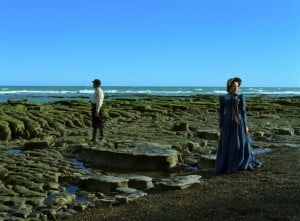 JAUJA **** FIPRESCI winner | Cannes | 2014
JAUJA **** FIPRESCI winner | Cannes | 2014
JAUJA (Land of Plenty) is a philosophical, existential drama, almost as enigmatic as the mythical place it claims to represent – an Argentinian ‘El Dorado’. Lisandro Alonso has wisely chosen Viggo Mortensen to play the role of a respectable but unsettled Danish 19th army captain travelling across the rugged region with his teenage daughter (Viilbjork Mallin Agger) and a motley collection of soldiers who speak Spanish, purportedly on a mission to wipe out the Zuluagas – a lethal tribe of natives, nick-named “Coconut Heads”. In a horseback search across hostile terrain, the captain’s brushes with the Zuluagas are eerie and lethal. A change of tone midway signals a descent into a fantasy time-warp bringing the narrative back to contempo Denmark in a surprising but enchanting denoumen. Finnish photographer, Timo Salminen, captures this magical story in long takes, sumptuously lighting each frame as a work of art as Mortensen flexes his musical talents in an original score. MT
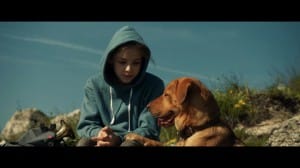 WHITE GOD **** Un Certain Regard WINNER | Cannes | 2014
WHITE GOD **** Un Certain Regard WINNER | Cannes | 2014
Hungarian director, Kornél Mundruczó’s art house thriller has a ‘Pied Piper of Hamlin’ feel to it. An enigmatic parable that scratches the edges of horror, there are some bizarre and brutal elements. Dogs, or more correctly, mutts are the stars of the story which opens with a little girl cycling through the streets of Budapest, followed by a pack of barking beasts (front picture). From Alsations to Labradors, Rottweilers and even little terriers, WHITE GOD also brings to mind The Incredible Journey with a more sinister twist. These dogs are clearly well-trained and credit goes to the Mundruczo for his ambitious undertaking but then Magyars have a reputation for their handling skills with horses and this clearly extends to the canine species. Lilli (Zsofia Psotta) the girl on the bike, has adopted a large street dog called Hagen in a modern parable, quite literally, a tale of the ‘underdog’ rising up and claiming his rightful place in society. WHITE GOD is a unique and really captivating piece of filmmaking.MT
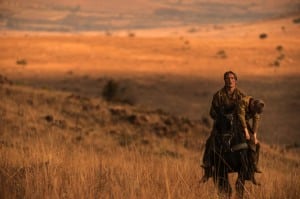 THE SALVATION **** | Denmark| US | 2014
THE SALVATION **** | Denmark| US | 2014
It’s always gratifying to see a great film that hasn’t had much buzz, pre-festival. THE SALVATION is one of those outings: but with Mads Mikkelsen and Eva Green what could go wrong? Well, we’ve certainly found the next Clint Eastwood in Christian Levring’s Danish-American Western. As Jon, a former soldier who immigrated to America after the Danish-German war in 1864, Mads has just the right look and smouldering buttoned-up anger to keep the action taut and macho throughout this glowering, sun-burnished saga shot by lenser Jens Schlosser in South Africa and with echoes of High Noon. When Jon’s wife and son join him in the lawless Mid West after joining him from Denmark, they are brutally killed; the modest, law-abiding outsider Mads turns hurt into hatred, by taking the outlaw’s life in return. Eva Green seethes in a speechless part (as Princess) rendered mute by an Indian’s weapon and married to the Colonel (Jeffrey Dean Morgan) who heads up the villainous Delarue Family, and looking for retribution. With a zippy running time of 89 minutes, this is a slick and enjoyable ride through the Wild West: Danish angle works well with the xenophobic locals of the era. MT
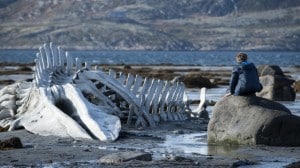 LEVIATHAN **** | Russia | 2014
LEVIATHAN **** | Russia | 2014
A saga set in Northern Russsia. Before anything else are the familiar strengths of Andrei Zvyagintsev’s work: Regular cinematographer Mikhail Krichman shoots with a reliance on the natural light of northwest Russia’s late summer/early autumn, giving the whole thing a pallet at once unhealthily under-lit and richly blue. Elena Lyadova, a less central performer in ELENA, is here elevated to key player: in her, Zvyagintsev has found an actress whose hardened beauty betrays all the hurt and disappointment that an ordinary life down on the lower rungs can bring. In so much as a glance here, she conveys a woman caught between the rock of an unhappy marriage and the unbearably hard place of a doomed affair. Philip Glass’s music also returns: ‘The Ruins’, from his 1983 opera Akhnaten, bookends proceedings over sequences of harsh, foreboding cliff faces and crashing, ominous waves. Does the film overreach? Though such passages as that just mentioned are vivid and gripping in themselves, they do suggest a director who’s possibly too eager to imbue his work with an air of thematic significance. All the more refreshing, then, that the film is also Zvyagintsev’s funniest by far. Never settling for any one simple tonal register, it at times reaching levels of black satire, most notably in its early depictions of Vadim the mayor, a shark in a small pond whose office boasts a framed portrait of Putin, to whose shady Machiavellianism he palpably aspires (other framed leaders, from Lenin to Gorbachev, feature in another scene). As Vadim, Madyanov steals the show, resembling a fluffy teddy bear dowsed in vodka one moment and a ruthless, no-nonsense brute the next. MP
Guy Myhill’s debut evokes the open spaces of Norfolk veiled in golden summer. An unsettling coming of age story, it pits a young man’s burgeoning sexuality against that of his mother’s boorish boyfriend – an avid stock-car racing champion and local grower. Simon Tindall’s ethereal camera-work captures the rough and ready appeal of this farming landscape and its gutsy inhabitants and a soft-focus arthouse twist contrasts well with the pumping score of hits that include Donna Summer. Constantly on the move, the restless Dardennesque pace also brings to mind that motorcycle opening sequence of Lawrence of Arabia. This is a very English affair bristling with sexual tension and dreamy awakenings from childhood to young adulthood in the Fens, it teases with an enigmatic storyline that weaves into focus then departs again in a different direction, never quite revealing itself but conjuring up a family in turmoil. A really atmospheric indie Britflick. MT
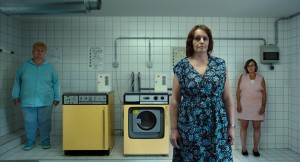 IN THE BASEMENT (IM KELLER) **** | Austria | 2014
IN THE BASEMENT (IM KELLER) **** | Austria | 2014
After exploring the sex lives of a three contemporary women (Love, Hope, Paradise), Austrian maverick, Ulrich Seidl, plumbs the domestic cellars of his homeland for more outrageous material in his latest documentary IM KELLER (In The Cellar). A word normally applied to horror film ‘unheimlich’ describes these underground spaces that are the total opposite of cosy: we meet group of characters who appear only too happy to share with us their unusual habits and hobbies in this subterranean world. With his regular collaborator Veronika Franz, Seidl’s preoccupation with obesity, nudity and S&M goes hand in hand with religious bigotry and undercover Nazis (Hitler was, of course, Austrian) – all are alive and kicking in the homes of the outwardly innocuous Austrians. Indie and art house audiences with a penchant for the macabre and Seidl’s dark brand of humour will certainly flock to see Im Keller even though it is, in parts, a sight for sore eyes. It certainly proves that in Austria as well as Yorkshire there’s ‘nowt so queer as folk”. Guaranteed to make you squirm in your seats.MT
The fascinating career of Robert Altman is the subject of Ron Mann’s biopic that kicks off with the auteur’s chance meeting that changed his life. It all seemed so simple in those days, one lucky meeting leads to a career spanning 50 years. But you do need talent, of course, and perseverance, and Altman, we discover, had this in spades along with an ability to inspire and impress, and to re-invent himself in a career that led to prodigious TV work (Bonanza) before he even started making films. The only director to win top prize at three major European film festivals (Cannes, Berlin, Venice) and the first director to have concurrent conversations in his films; he developed a way of recording, allowing audiences to listen to several conversations at once, adding a feel of reality to his dramas. He also invented the ‘portmanteau’ film (Short Cuts, The Player). The majority of his films were financed independently and box office standout Gosford Park found finance at the last minute through the UK Lottery: ironically it was also made after he received the heart of a young woman. Packed with fascinating details, Mann’s doc is watchable and entertaining. MT
Peter Strickland’s focus on the exploitation genre has already alighted on the Italian ‘giallo’ (Berberian Sound Studio) and the ‘revenge thriller'(Katalin Varga). Here he turns his talents to a seventies-set story of lesbian erotica. The Duke in question is a butterfly, delicately exploring the love between two female etymologists engaged in a dominant/submissive affair. Chiara D’Anna (Evelyn) and Sidse Babett Knudsen (Cynthia) play the lovers in this intriguing and unconventional drama which drifts into dreamlike abstract and experimental episodes (complete with unusual sound effects) evoking the emotional ecstasy of this complex sexual adventure. MT
THE BFI LONDON FILM FESTIVAL RUNS FROM 8 – 19 OCTOBER 2014 ALL OVER LONDON